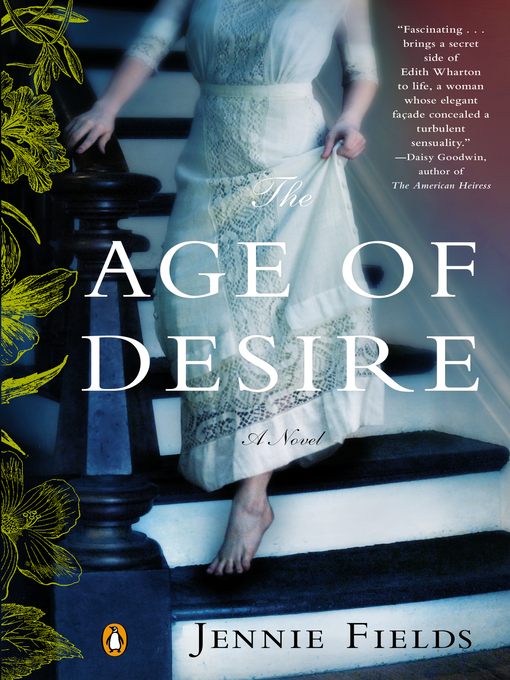
The Age of Desire
A Novel
کتاب های مرتبط
- اطلاعات
- نقد و بررسی
- دیدگاه کاربران
نقد و بررسی

June 4, 2012
In Fields’s delicate and imaginative fourth novel (after Crossing Brooklyn Ferry), Edith Wharton struggles with the passion she feels for Morton Fullerton. Trapped in an unhappy marriage to the increasingly erratic manic-depressive Teddy, Edith is both fascinated and frightened by Morton’s push-pull flirtations, his attentions tapping into parts of her she didn’t know existed, since conjugal relations with Teddy have always been unpleasant. Edith’s former governess Anna, now her friend, confidant, and secretary, is worried about Edith’s susceptibility to Morton’s flattery, and draws closer to Teddy, whom she believes Edith treats unfairly. As Edith gets more involved with Morton, she sends Anna off to explore her own life, a “gift” that means she won’t have to face her friend’s disapproval. The layered dynamics of these characters add texture to scenes ranging in setting from London to Paris to The Mount in Lenox, locations that either compliment or contrast with what unfolds. The book’s only flaw is the choice of present tense, which draws unwanted attention to the time period and pushes readers out just when they should be pulled in. Still, Fields’s love and respect for all her characters and her care in telling their stories shines through. Agent: Lisa Bankoff, ICM.

August 1, 2012
Joining the burgeoning genre of novels concerning famous people's unknown subordinates, Fields (The Middle Ages, 2003, etc.) offers a fictionalized account of Edith Wharton's troubled love life in large part through the eyes of her former governess and lifelong secretary, Anna Bahlmann. By age 45, Edith has found literary success with the publication of The House of Mirth, but is miserably unhappy in a sexless, lifeless marriage. Teddy Wharton is a simple man, totally unsuited to Edith, although 60-year-old Anna has always admired and been secretly a little in love with him herself. During their annual winter in Paris in 1908, Edith meets and falls headlong in love with Morton Fullerton, a Harvard-educated journalist. More than one literary acquaintance warns Edith that Morton has a licentious reputation--that he has been one of Henry James' "favorites" should be warning enough--but Edith, elated by her new sense of herself as a desirable woman, pursues Morton as much as he pursues her. Witnessing the growing infatuation, Anna is torn between her devotion to Edith and her loyalty to Teddy, who sinks into a severe depression, a harbinger of the madness to come. Anna's moral disapproval irritates Edith's own guilty discomfort, and she sends Anna temporarily away. With Morton, Edith discovers sexual passion (in some excellent erotic writing) but is frustrated by his emotional slipperiness. Meanwhile, Anna has her own, much quieter romantic adventure, although her first commitment remains with Edith. Fields does not simplify their relationship; they call themselves friends, but Edith often treats Anna as a servant, a role Anna accepts with a sanguinity modern women may not appreciate. As in life, fictional Anna never becomes more than a foil to the fictional powerhouse that is Edith. Teddy is a tragic figure, his basic decency eroded by Edith's understandable inability to appreciate him. Morton remains the mystery, neither his motives nor his charms made quite clear enough. One doesn't have to be an Edith Wharton fan to luxuriate in the Wharton-esque plotting and prose Fields so elegantly conjures.
COPYRIGHT(2012) Kirkus Reviews, ALL RIGHTS RESERVED.

June 15, 2012
Fields's (The Middle Ages) fourth novel finds a middle-aged Edith Wharton discovering physical passion for the first time as she embarks on an adulterous affair with a charismatic younger journalist. Their increasingly tempestuous relationship has unexpected consequences; it tests Edith's long-time friendship with Anna Bahlmann, her governess turned personal secretary, who has sacrificed her own chances for romantic love and a family of her own for the sake of Edith and her husband, Teddy. Fields supplements the story with fascinating excerpts from Wharton's actual letters and includes appearances by other authors of the period, including Henry James and Paul Bourget, to re-create the exciting literary landscape of Paris and New York in the first decade of the 20th century. VERDICT Readers may find it hard to sympathize with the perpetually self-obsessed Edith, whose callousness toward her ailing husband is particularly difficult to excuse, but the novel should nonetheless appeal to those who enjoyed Paula McLain's The Paris Wife or other stories focusing on the stormy romantic lives of creative people from past eras.--Mara Bandy, Champaign P.L., IL
Copyright 2012 Library Journal, LLC Used with permission.

July 1, 2012
Edith Wharton lived in the glittering world of the moneyed elite she wrote about, although she never experienced her characters' lustful motivations herself until she met American journalist Morton Fullerton. Fields bases her perceptive novel on Wharton's own diaries and letters. By 1907, Edith is tired of husband Teddy's gaucheness and depressive episodes and succumbs to the charms of Fullerton, whom she encounters at a French dinner party. It's hard not to pity her, for he is obviously a cad, but she displays a touching vulnerability, opening herself to passion for the first time at 45, and her anguish at Fullerton's inconstancy is deeply felt. Readers also observe them from the viewpoint of Anna Bahlmann, the literary secretary and longtime friend Edith sometimes carelessly takes for granted. Gentle Anna doesn't approve of the affair, which drives her and Edith apart for a time. While the novel concentrates more on the emotional than the intellectual sphere, it sheds welcome light on the little-known private life of a famous woman and her closest relationships in early-twentieth-century Europe and America.(Reprinted with permission of Booklist, copyright 2012, American Library Association.)

























دیدگاه کاربران